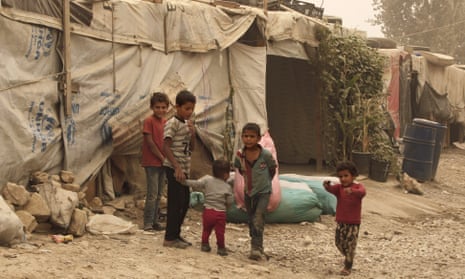Charities and aid agencies have urged the public to donate money to help support Syrian refugees rather than offer items such as tents or blankets.The World Food Programme (WFP) and Unicef have said they are facing a chronic lack of funding and are being forced to cut aid including food, healthcare and education programmes for the estimated 4 million Syrians stranded in camps in countries across the Middle East.
They say an increasing number of “protracted refugees” living in centres in Jordan, Lebanon, Turkey and Iraq will attempt the treacherous journey to Europe because they cannot offer their families a life or a future in the camps.
The WFP said aid fatigue has left it with a $341m (£221m) shortfall, forcing it to cut to 500,000 recipients from its food programme because of the falling international interest in the crisis. It distributes basics including lentils, rice and beans to about 4 million refugees in Syria and another 1.4 million outside the country.
Abeer Etefa, a spokeswoman for the WFP in the Middle East, said: “Every little initiative helps, but right now we need cash. It costs us $46m to feed people every week and we are having to take the less vulnerable off the list and deal with only the extremely vulnerable.”
Islamic Relief (IR), a charity established in Birmingham more than 30 years ago that is working inside Syria and in neighbouring countries, echoed the appeal for donations.
Martin Cottingham, IR’s head of communications, said: “What the agencies on the ground need most of all is cash. Sometimes the impulse is there to help and that is great, and we have a heart for the people in need and want to connect with them. We have seen people organise convoys and while we hugely admire the bravery and commitment, please channel your desire to help through the charities on the ground.”
The UN said it has only raised 37% of the funds it needs to keep operations going, while Unicef said the humanitarian operation in the Middle East is the worst the agency has seen in its nearly 70 years of existence.
The Disasters Emergency Committee (DEC), which acts as an umbrella fundraising body for aid charities, is considering launching a fresh appeal to help refugees, but said it needs to be convinced the public will respond.
The DEC works with 13 charities and has to satisfy three criteria before it will launch an appeal. The criteria are: is there an overwhelming need? Is there an ability of members to respond? Is there public support?
Its last Syrian appeal was cut short as the public response declined. A DEC spokesman said: “It was 2013 and we continued it because we did not feel in conscience that we could end it, but after 13 months we had to close it because the money simply wasn’t there.”
Charities have reported a surge in donations since the publication of the photograph of Alan Kurdi, the three-year-old boy who drowned on a Turkish beach, with Save the Children raising £1.2m in a matter of days.
But the DEC’s last Syrian campaign raised just £27m, compared to £83m for the Nepal earthquake appeal and the £392m donated in the wake of the Indian Ocean tsunami in 2004.
Juliette Touma, Unicef’s spokeswoman in Jordan, said: “The focus in the past week has been on the refugees in Europe, but it is important to make the link to Syria, where 70% to 80% [of them] have come from.”
She said the UK has been one of its biggest donors, but the public can help by giving cash and becoming advocates, writing to their MPs and holding fundraising events.
Touma said: “I have been here since the beginning almost five years ago. It is about time the war finished. Here in Unicef we have never seen anything like this.”
Many families are taking extreme measures to cope with the difficult circumstances, including removing their children from school so that they can work, incurring large debts and cutting back on the nutritional value and quantity of the food they eat.
Unicef said child labour is on the increase: “In Jordan, close to half of all Syrian refugee children are now the joint or sole family breadwinner.”
Médecins sans Frontières (MSF) also appealed to donors. A spokesman in Amman said that, while its operations are fully funded, “no matter how much money we throw at it, it is never enough”.
MSF’s Sam Taylor said: “I am not sure if people are really aware how appalling it is. We have an operation an hour away on the border and the barrel bombs cause horrific injuries.”
Islamic Relief and MSF said the health system in Syria is decimated and the need for reconstructive surgery and burns treatment is enormous. There are an estimated 1.5 million people with non-life threatening injuries due to the conflict.
